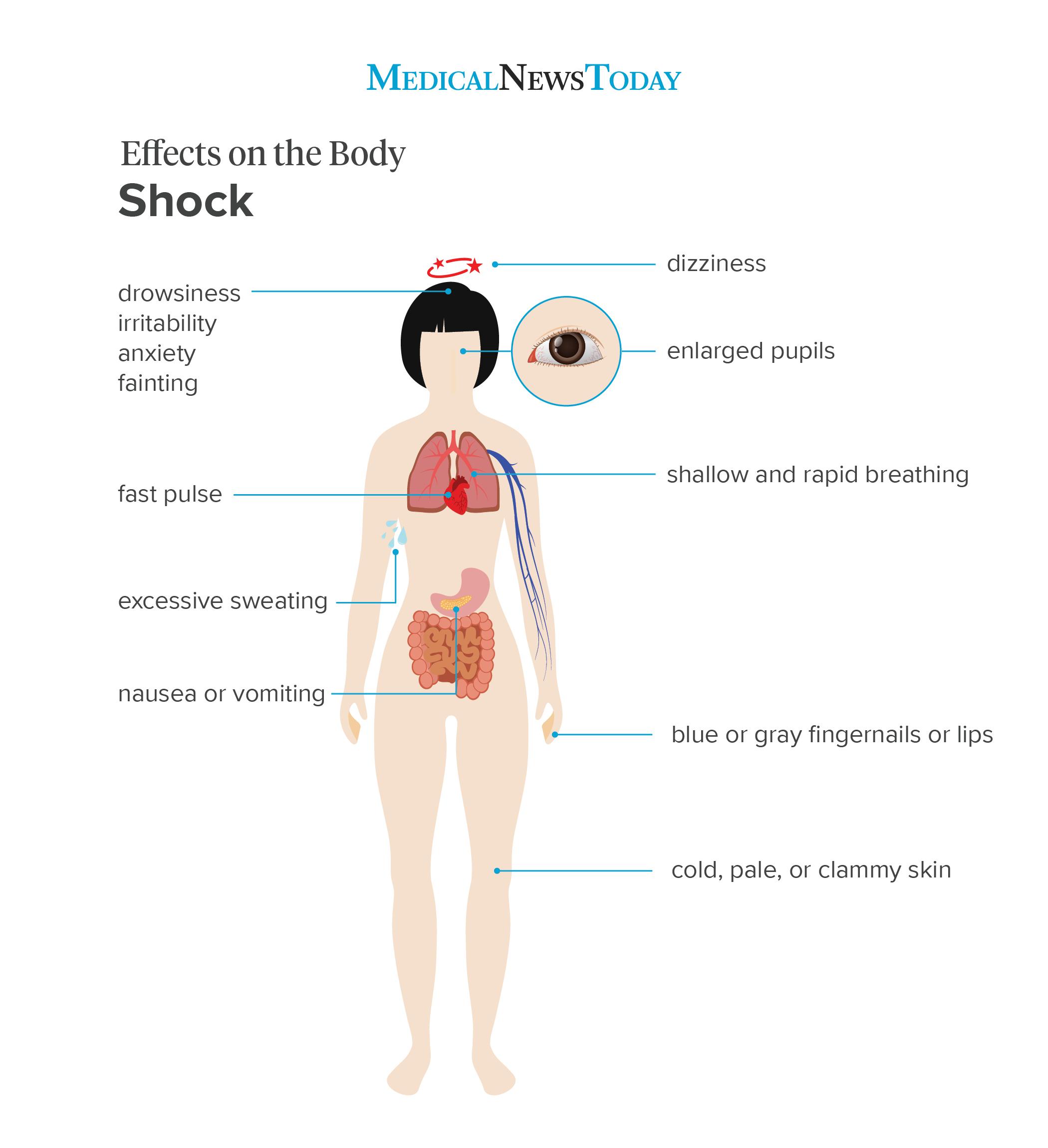The word shock can describe several different situations. Medical shock happens when the body’s cells do not get enough oxygen-rich blood. It is not a disease but a result of an illness or injury.
A person may also feel shocked when they experience something unexpected. This shock is psychological and usually does not cause any medical problems.
Another type of shock is an electric shock, which occurs when a person sustains an injury as a result of exposure to electrical energy. Causes of an electric shock include faulty electrical equipment, lightning strikes, and contact with electricity and water.
Although many different problems can cause medical shock, its symptoms are often the same. Medical shock is always an emergency. Without treatment, shock may cause permanent organ damage or death.

There are four different types of medical shock. The name of each type describes how it causes a decrease in blood flow to the cells and tissues.
The four types are:
- Hypovolemic shock. Hypovolemia is a decreased volume of blood in the body, and it may happen if a person is bleeding heavily or becomes severely dehydrated. This type of shock is
usually due to severe blood loss following a traumatic injury. - Cardiac shock (also known as cardiogenic shock). This type of shock occurs when the heart is unable to pump enough blood. The causes of cardiac shock include a heart attack, heart failure, severe blood loss, or an injury to the chest that damages the heart.
- Obstructive shock. Obstructive shock happens when a blockage in the cardiovascular system, such as a pulmonary embolism, keeps blood from flowing to the body’s tissues and organs.
- Distributive shock (also known as vasodilatory shock). In distributive shock, fluid may collect between the cells of the organs, making it hard for the blood to reach the tissues. The
most common causes of distributive shock include anaphylaxis, which is a severe allergic reaction, and sepsis. Poisoning or toxicity from drugs can also cause this type of shock.

Although medical shock has many different causes, its symptoms are generally the same. The symptoms are a result of the body’s organs and tissues not getting enough oxygen.
Signs and symptoms of shock include:
- cold, pale, or clammy skin
- excessive sweating
- fast heart rate
- shallow and rapid breathing
- drowsiness
- fainting
- blue or gray lips or fingernails
- irritability
- anxiety
- dizziness
- enlarged pupils
- nausea or vomiting
If a person is in shock, the first step is to call 911 or the local emergency number, even if the symptoms are mild.
While waiting for the medical team, people can assist by:
- helping the person lie down and elevate their feet, if possible
- avoiding moving the person if they may have injured their head, neck, or back
- performing first aid on injuries if necessary
- keeping the person warm with a blanket or coat
- refraining from giving the person food or drink
- checking for breathing and a pulse at least every 5 minutes (if the person is not breathing, a trained person can perform cardiopulmonary resuscitation (CPR))
- turning the person on their side if they are choking or vomiting
Medical professionals often recognize shock because of its characteristic signs, including low blood pressure.
The treatment for shock will vary based on the underlying cause. For instance, a person experiencing anaphylaxis may need a shot of epinephrine, which can treat severe allergic reactions.
If a person has sepsis, they may need antibiotics, oxygen, and intravenous (IV) fluids.
People with hypovolemic shock may need a blood transfusion and IV fluids. Doctors may start blood transfusions or other measures to help restore proper blood flow, even if they do not know the underlying cause.
The medical team may run various tests to determine the cause of shock, including:
After a person receives treatment for shock, a doctor may help them put a follow-up plan in place to help prevent another event. Some examples include:
- People who have cardiogenic shock due to a blood clot may need additional treatment to break up the clot.
- A person who went into anaphylactic shock may need to carry epinephrine or other medications to help stop allergic reactions. They will also need to avoid contact with allergens in the future.
- A person who had a heart attack may require lifestyle changes and medications to help reduce the chances of another heart attack.
It can take some time to recover from any type of medical shock. Shock can cause fatigue, muscle aches, and trouble with strength or mental function. Sometimes, these effects are long lasting.
People may need rehabilitation, either in the hospital or in another facility. They may also need help with tasks at home as they recover.
After septic shock, some people experience lingering side effects, such as pain or trouble concentrating or remembering things. Depression or anxiety may also occur. Talking to a doctor about these effects can help during recovery.
Medical shock is a life threatening condition. It occurs when the organs in the body are not getting enough oxygen.
Causes of shock include severe blood loss, dehydration, and a cardiac event. It is important to seek immediate medical care for any symptoms of shock, even if they are mild.
Source link
 Black America Breaking News for the African American Community
Black America Breaking News for the African American Community